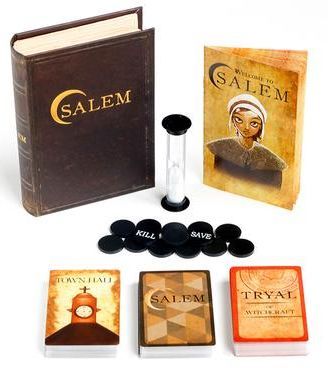Welcome to my review of the board game ‘Salem‘! If you think witch hunts and courtroom drama sound like a fun way to spend an evening, then you’re in for a treat. Salem is all about paranoia, suspicion, and a bit of luck thrown in for good measure. You and your friends will point fingers, make accusations, and experience the thrill of a good mystery unraveling right on your dining table. But is it balanced enough to offer a fair game every time? Let’s figure it out!
How It Plays
Setting Up
Start by giving each player a role card, just like that one time I played Wendy from the fast-food chain. Layout the game board, and mix the decks. Distribute accusation tokens like you’re Oprah handing out cars. Everyone gets one! Make sure everyone knows the player sitting next to them is definitely the witch – adds to the fun.
Gameplay
Players take turns, like a civilized society, accusing others of being witches. Draw cards, and if you ever get the feeling you’ve drawn nothing but bad luck, welcome to the club. Use your cards wisely to protect yourself or expose others, and remember, bluffing is as important as your poker face. Players vote on who they think should be on trial; yes, it’s like high school but with witches. Fun, right?
Winning the Game
To win, you either hang all the witches or survive as a witch until the end. Once all the witches are identified and ‘eliminated,’ non-witches claim victory. But if any witch survives the trials, well, the witches cackle their way to victory. Trust no one, and remember, trickery and accusations are the name of the game!
Want to know more? Read our extensive strategy guide for Salem.
Game Mechanics and Fairness in Salem Board Game
Ah, Salem! A game that takes you back to the witch trials of a spooky 1692. Now, before you dust off your pointy hat and hop on your broom, let’s talk about how fair the mechanics are. My pals and I gathered around a dimly lit table and experimented with Salem’s mechanics one evening, hoping not to accuse the wrong witch – or worse, get accused ourselves!
The game is all about accusing others and defending yourself, like a nod to Among Us before it was cool. Each player gets a secret role, and you’re either a townsperson or a sneaky witch. It was like a high school drama club on steroids. The twist? Only a couple of people know who the witches really are. Solid mechanics, if you ask me! However, where things get a little unbalanced is how much weight luck holds here. You draw and expose trial cards, and sometimes, it feels like you’re playing Uno with a deck of jokers. The luck can make or break the game, which leaves some players feeling more ‘hacked’ than ‘accused’.
While Salem provides thrilling accusations and strategic decisions, the luck factor can be a bit of a killjoy. If you’re the kind of player who rolls their eyes at Lady Luck’s antics in board games, you might want to lower your expectations a notch or two. We had a blast, yet a few of us felt the mechanics could have used a bit more balance.
Next up, we’ll chat about how much players engage with each other in Salem and whether the witches among us can stay undetected.

Boosting Player Interaction and Engagement in Salem
One of the things that makes Salem so intriguing is how it ropes players into a tangled web of interaction. Picture this: everyone sitting around, suspicious stares thrown across the table like confetti at a parade. On my first session, my friend Joe almost flipped the table after a heated accusation – classic Joe move! This isn’t just a game of strategy but a social affair that tests friendships and acting skills alike.
Inside this village, players constantly engage by pointing fingers, defending their honor, and unmasking those pesky witches. Trust me, there’s nothing quite like that moment when a friend confidently accuses you, just to be proven hilariously wrong. With each card played, players weave a narrative that could rival any soap opera. It’s a dynamic blend of deduction, bluffing, and good ol’ fashion whodunit.
Salem ensures everyone is on their toes, with everyone desperately preserving their innocent facade, or secretly working to sabotage others as a hidden witch. The real beauty lies in how each game night feels different. With variable roles and strategies, each new game is like shuffling a fresh deck of drama. This keeps everyone glued to the table, eager to see where the plot twists next.
However, beware: if you’re a fan of harmony and peace at your game nights, this might not be your cup of tea. Here’s a heads up, though – in my next section, I’ll unravel the enchanting theme and atmosphere of Salem that mischievously pulls players into its bewitching embrace.
Theme and Game Atmosphere in Salem
If you’ve ever wondered what it feels like to be stuck in a room full of paranoid Puritans, Salem is the game for you! Salem’s theme is like brewing a perfect storm of suspicion, historical intrigue, and finger-pointing drama. Picture yourself in the terrifying 1600s, where your neighbors might just accuse you of being a witch, and not in the ‘fun, cackle over a cauldron’ kind of way. It’s more like, ‘pack your bags, we’re heading to the gallows!’
Now, playing Salem with your friends is an experience I can only describe as an emotional rollercoaster. My buddy Steve once accused me of being a witch, based solely on the fact that I had a suspicious grin. Completely unfounded, I assure you, but in Salem, that’s enough to get you excommunicated! The game’s atmosphere encourages you to scrutinize every raised eyebrow and every nervous chuckle. It’s a bit like Thanksgiving dinner with the in-laws, but with more historical accusations and less pie.
The art and cards do a great job at setting the scene, with motifs that scream ’17th-century witch trial’. You’ll find yourself immersed in the grim vibe, especially when someone starts yelling ‘witch!’ with a serious look and maybe a bad British accent to boot. The game thrives on this tense atmosphere, transforming your living room into a stage for deceit and deduction.
Next, I’ll be spilling the beans about Salem’s overall replayability and excitement factor. Trust me, it’s a cauldron of emotions you won’t want to miss!
Replayability and Excitement in Salem
Oh boy, let me dish out all the drama and excitement that Salem brings to the table! Now, I’ve played Salem a few times with my group of friends, and let me tell you, each round feels like opening a new chapter of a mystery novel. I’ve got this one buddy, let’s call him Larry, who always seems like a suspicious character no matter what role he’s got. The game’s replayability shines as players take on different roles, keeping everyone on their toes with each playthrough.
One of the aspects that stands out in Salem is how it keeps everyone guessing and second-guessing. The tension mounts as accusations fly, which keeps the adrenaline pumping and the excitement levels high. The game’s structure means players need to think on their feet, adapt strategies, and embrace a healthy dose of paranoia. There’s nothing quite like the moment when you realize you’ve been barking up the wrong tree, or when everyone suddenly turns on you with wild accusations!
Now, onto the question of whether I’d recommend Salem. Absolutely! If you’re into social deduction games that are rich in theme and have a dynamic gameplay that encourages replay, Salem should be on your shelf. It’s a whirlwind of fun, and even if the occasional luck factor sneaks in, the overall experience is thrilling. Just make sure to keep your wits about you, because in Salem, everyone’s a little bit witchy!
Conclusion
Salem spins a thrilling tale of paranoia and strategy, perfect for a lively game night. The theme immerses players in a historical witch trial drama, with strategic decisions and a bit of luck. Player interaction shines, as accusations fly and alliances shift. However, if you dislike luck’s role alongside strategy, Salem might leave you frustrated. Despite this, its replayability keeps the excitement alive, thanks to its dynamic roles and engaging gameplay. Salem might not be for everyone, but if you enjoy drama and intrigue, this game deserves a spot on your shelf. That’s a wrap on my Salem review—until next time, happy gaming!


